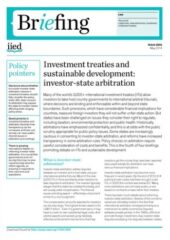
Many of the world’s 3,000+ international investment treaties (IITs) allow investors to take host country governments to international arbitral tribunals, where decisions are binding and enforceable within and beyond state boundaries. Such provisions, which have considerable financial implications for countries, reassure foreign investors they will not suffer unfair state action. But states have been challenged on issues they consider their right to regulate, including taxation, environmental protection and public health. Historically, arbitrations have emphasised confidentiality, and this is at odds with the public scrutiny appropriate for public policy issues. Some states are increasingly cautious in consenting to investor-state arbitration, and reforms have increased transparency in some arbitration rules. Policy choices on arbitration require careful consideration of costs and benefits. This is the fourth of four briefings promoting debate on IITs and sustainable development.

Rejoignez-nous sur
LinkedIn X Facebook